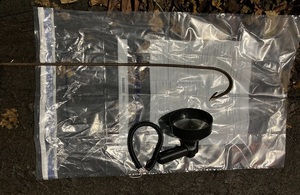County Durham man fined for illegal fish killing
Press release
The Environment Agency is urging anglers and rivers users to remain vigilant to suspicious activity after a man is fined for killing fish with banned equipment.

The gaff and lamp used during the incident.
Jordan Aldworth, 26, of St John’s Walk in Escomb, near Bishop Auckland, was fined £450 and ordered to pay costs of £145.
He pleaded guilty to killing or taking fish using illegal equipment at County Durham & Darlington Magistrates’ Court on 5 April.
On 25 November 2020, acting on information from the public, an Environment Agency fisheries enforcement team took up an evening watch on the River Wear near Escomb.
They saw Mr Aldworth, along with two other people, using a light and an illegal gaff (a spear with a large hook at the end) to kill salmon in the shallow waters. The group was later stopped by police and Environment Agency fisheries enforcement officers.
Mr Aldworth used the illegal equipment to kill salmon at a time when the fish are at their most vulnerable during the spawning period, when they are also protected by a fishing “close season”.
The River Wear is an important fishery for migratory salmon and sea trout, and the gravel-based shallows near Escomb are an established spawning ground.
David Shears, Senior Fisheries Enforcement Officer for the Environment Agency in the North East, said:
The law against using this damaging equipment exists to protect future salmon and trout populations. We’re thankful to the people who report illegal activity to us and urge the public to look out for anything suspicious and report it right away.
We won’t hesitate to take action to stop illegal fishing or killing and hopefully this will act as a deterrent for anyone thinking of breaking the law.
Those who fish illegally can expect to be prosecuted and face a fine of up to £2,500. Illegal fishing can be reported to the Environment Agency on 0800 80 70 60.
You can buy a rod licence online
Published 13 April 2022
